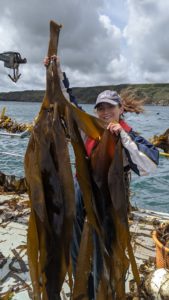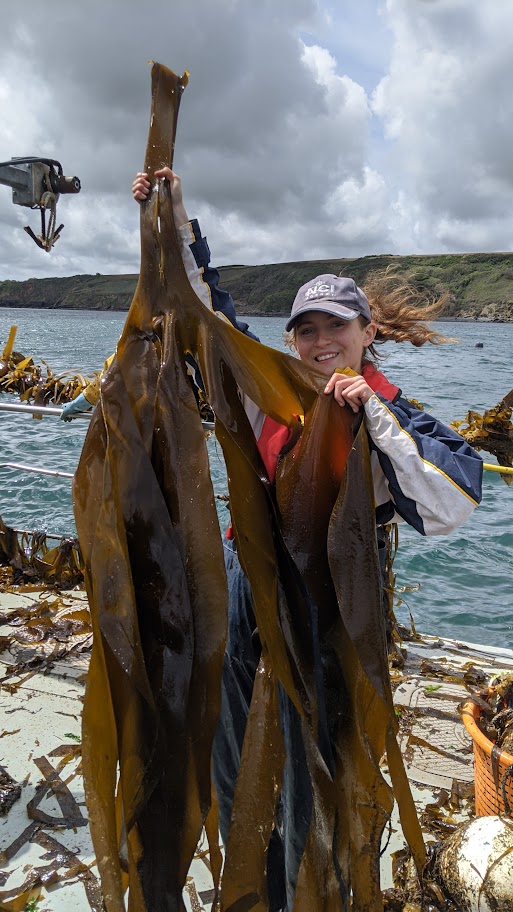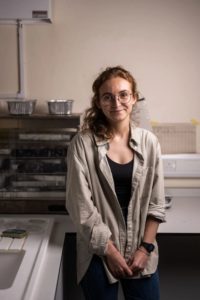University of Exeter PhD student Sophie Corrigan recently published a paper investigating the habitat value of a sugar kelp farm in Cornwall for epibiont species and whether this could be extended with different harvesting techniques. Read on as we hear from her about her research and PhD journey:
Hi Sophie, thank you for joining me to talk about your research. Let’s start with a bit of background about you and your work:
I started at Exeter in 2015 with my undergraduate degree, where I studied marine biology with an integrated Masters. After that, I worked as a research assistant at the University, investigating Atlantic carbon dioxide fluxes for a European Space Agency funded project. I was interested in helping to quantify some of the big issues in the world like the climate crisis, but I also wanted to move into investigating potential solutions to our problems and help instigate positive changes to tackle this. I saw this PhD on seaweed farming, which is also with my supervisor that was working with at the time. There has been a lot of interest in the potential environmental benefits and sustainability of seaweed farms, which include supporting biodiversity and nutrient cycling , so I was really keen to learn more about this as a potential low-carbon food source. So, I started that at the end of 2019 and I’m now in my 4th year, working at the University of Exeter and in collaboration with the Marine Biological Association and Cefas. I also work with two small-scale farmers in Cornwall, which is great because that’s where I did my undergraduate degree and now I’m split between the Streatham campus, the Penryn campus and the Marine Biological Association in Plymouth so it’s nice to still be in the southwest and contribute towards developing sustainable industries there.
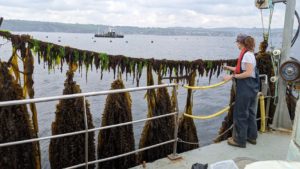
So, what have you been working on recently?
My PhD in general looks at the potential for seaweed farming to enhance biodiversity and provide habitat to different species which may be of commercial or conservation importance. I’ve worked with these two farms in Cornwall to establish a baseline about which species are attracted to the farms and grow on the farms as well as the seaweed, and I compare whether it’s similar to what would be provided by wild kelp beds or mussel aquaculture. I’ve investigated everything from the small invertebrates that live on the seaweed, to how the benthic infauna is affected, and most recently fish populations at the farm. The paper that’s recently come out was looking at how biodiversity develops over and beyond the growing season on one of the farm sites in Cornwall and whether this can be maintained by using different harvesting techniques with the farmers, as obviously they want to be as environmentally friendly and commercially profitable as possible. I’ve been working with them to develop an ecosystem approach to aquaculture, and we found that seaweed farms could provide a significant habitat to many species under certain conditions .
One of the limiting factors is obviously the harvesting process, which removes all of the biomass and biodiversity at harvest time and so we investigated whether this could be extended. We found that it can, although this has some detrimental impacts to crop quality, so we might have to go back and revisit some of those aspects. But yes, it looks like farms provide a significant habitat for invertebrate species before harvest, which can have quite significant biomass and then provide their own ecosystem services and food for higher trophic levels like fish, which we’ve seen in the recent camera surveys I’ve conducted this summer.
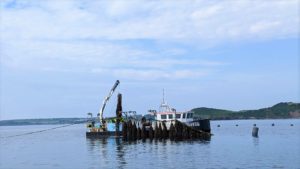
Great, so can you tell us more about the methods you used for your research?
This work started in 2020 and we went out on the boat with the farmers to collect monthly kelp samples from the farm. I then processed these in the lab, to assess which species were on them and the taxonomic diversity, the abundance and the biomass. We repeated this every month up until harvest, which was in May and then beyond harvest into August. At harvest time we also set up some different trials with the farmers to work out whether leaving some of the biomass in the water would maintain the habitat value beyond the normal harvesting season. We then returned to the site the next year to compare how they had provided habitat to different species. I then investigated differences in assemblage structure between the different months and saw a great increase in diversity, abundance and biomass across the season.
The rest of my PhD research has involved using diving to collect kelps from wild populations to compare to the farmed kelps, using benthic grabs to assess infaunal diversity and the impact of the farms on the seabed, and camera and fishing surveys to assess how the farm affects fish populations and whether they are using it as a feeding ground through dietary analysis.
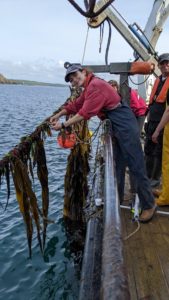
What’s next for this research and for you?
I’ve got this year to finish my PhD. I’m writing up the rest of my chapters, which also look at comparing the seaweed aquaculture to mussel farming and wild kelp populations. I’m also trying to determine how benthic infauna and fish populations are impacted, which may be of commercial or conservation importance. Beyond that, I’m hoping to continue my research in seaweed farming or aquaculture in general and I’m really interested in developing an ecosystem approach to aquaculture so that we can benefit from sustainable food without impacting the environment.
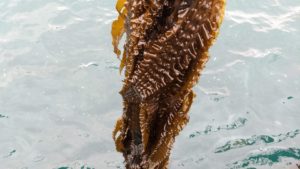
As you studied at the University of Exeter, would you have any advice for current students who might be thinking about doing a PhD?
Firstly, I think it’s so important that everyone knows that anyone can do a PhD, no matter what your background- the more diversity we get in academia, the better! I do think it’s really important to do a PhD in an area which you’re very passionately interested in and you want to develop your knowledge in. I would also recommend talking to the potential supervisors and see what is involved in the project and what your day-to-day will be like, for instance whether it’s more of a lab work based project or a desk work based project and understanding all the potential exciting opportunities you’ll get out of it. You’ve got to make sure you know what doing a PhD involves as it’s a long time to invest in a project and you’ve got to stay interested and engaged in it. I’d also definitely recommend talking to current PhD students in the same area too, as they really helped me decide if a PhD was what I wanted to do and inspired me to go for it!
